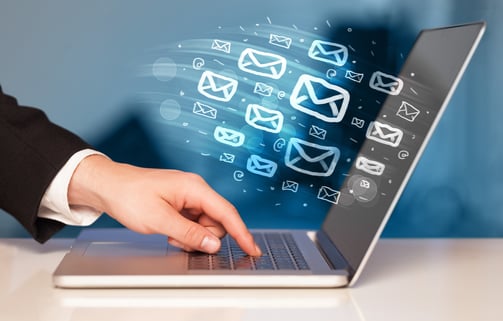 Email has been a part of our everyday life for quite some time now. These days with some restrictions imposed on face-to-face interaction, email has become an effective way to communicate. As a result of this the number of emails sent and received daily has been steadily increasing each year. According to Campaign Monitor an average person sends and receives 121 business emails per day. While, this is an effective way to communicate, handling such an amount of emails can become a challenge if one does not have a strategy of how to manage them. Managing incoming emails and ensuring that emails you send are effective is important in this digital age.
Email has been a part of our everyday life for quite some time now. These days with some restrictions imposed on face-to-face interaction, email has become an effective way to communicate. As a result of this the number of emails sent and received daily has been steadily increasing each year. According to Campaign Monitor an average person sends and receives 121 business emails per day. While, this is an effective way to communicate, handling such an amount of emails can become a challenge if one does not have a strategy of how to manage them. Managing incoming emails and ensuring that emails you send are effective is important in this digital age.
A few years ago, an article “How to Master Email” was published in the Executive Travel magazine that brought forward the risks associated with email communications. The article discussed the risks posed by email in the workplace and provided some examples of these risks as well as suggest strategies on managing emails. We thought that re-visiting these email ‘best practices’ may be useful as they can save time, increase productivity, and even improve conversational clarity. There was also information shared on LinkedIn with some insight on how the appropriate use of email communication can help in getting a more prompt response.
- The “three email” rule – often people email each other to death…email should be used to support clear communication. If after the third email the parties are still going back and forth and the issue is not resolved we are strongly encouraging a “good ole fashioned” phone call. Also, if you start you email with a certain type of greeting it could help increase your response rate significantly! Shockingly enough, being too formal gets you the lowest response rate so your relationship building skills come into play in a significant way when sending an email the first time. Starting an email with a simple “Hello” is one of the top rated response rates in grabbing the attention of the reader!
- Proofread your email carefully before you hit “send”. While useful, spell check is not a panacea and can frequently miss words that will change the meaning of your whole email. Errors in spelling, grammar and punctuation can damage your personal and your firm’s credibility, as well as dramatically alter the meaning of the document.
- Don’t interrupt what you are working on to check your email. The article in Executive Travel magazine quotes BBC news who said that workers distracted by email suffer a fall in IQ more than twice of that found in marijuana smokers. Immediately answer only those emails that are truly urgent and you will see improvement in your productivity and the quality of your work.
- Do not leave the subject line blank – many people delete subjectless emails. Email recipients often decide which email to open first by reading the subject line, so make sure the subject of your email is reflective of the purpose and point of the email. Ending your email with a closing such as “Thanks in advance” is the most popular way to close an email that gets the best response rate! All of these things matter when trying to bring an open item to conclusion. Choosing a sign-off that makes sense is an important piece of information to remember, no matter in what industry you’re working within. Know your audience!
Next time you feel like the emails will never end, remember you can help cut through the tedious back and forth by creating the best opening and closing as well as being clear and concise on what you are trying to ask for/ information you are providing to the other parties involved.
If you need help with any risk or insurance related issues, please contact Albert Sica, Managing Principal, at 732.395.4251 or asica@thealsgroup.com.

)